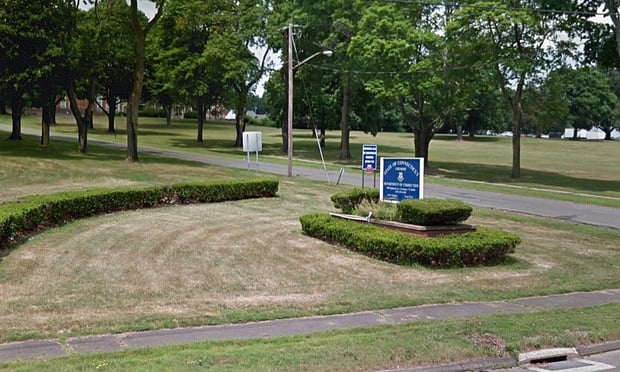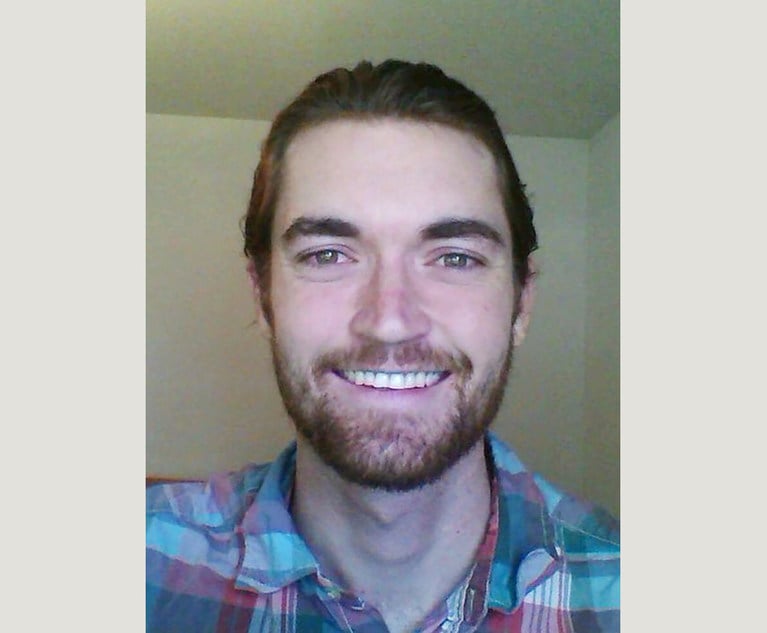Judge Rules for Dentist in Suit by Inmate
A federal judge has dismissed a lawsuit by an inmate who alleged a dentist's failure to follow up on his medical condition caused a mass around his left jaw bone to worsen. Judge Victor Bolden ruled the inmate did not have standing to bring the lawsuit.
October 30, 2018 at 03:44 PM
3 minute read
 Cheshire Correctional Institution. Photo: Google
Cheshire Correctional Institution. Photo: Google
A federal judge has ruled that a prisoner who sued a dentist for $5 million in punitive damages for allegedly not following up with him after he was diagnosed with a large mass around his left jaw bone did not have standing to bring the suit.
The civil rights lawsuit, filed pro se by Cheshire Correctional Institution inmate Darnell Tatem, alleged Naugatuck-based dentist Brian Perelmuter “never followed up” with him after he was forwarded his diagnosis and assigned his case. Perelmuter, the lawsuit says, was forwarded Tatem's medical history 13 days after the initial diagnosis of the mass. Perelmuter was sued in his individual capacity.
The lawsuit stated the mass in and around Tatem's left jaw subsequently developed into an infection resulting in Tatem requiring a four-week around-the-clock IV treatment to clear the infection. That, the lawsuit states, led to months of Tatem not being able to eat food or chew without pain and caused severe discomfort. The lawsuit was filed in March.
But, in dismissing the lawsuit Thursday, U.S. District Judge Victor Bolden of the District of Connecticut wrote Tatem “does not, however, allege facts suggesting that Dr. Perelmuter was responsible for Mr. Tatem's treatment on or around July 2, 2015, or at any point thereafter.”
Bolden said Tatem did not prove standing.
“To demonstrate standing, a plaintiff must allege an injury in fact that is fairly traceable to defendant's conduct and is likely to be redressed by judicial action,” Bolden wrote. The inmate, Bolden said, did not meet that burden.
“The fact that there is an intervening cause of the plaintiff's injury may foreclose a finding of proximate cause, but is not necessarily a basis for finding that the injury is not fairly traceable to the acts of the defendant,” Bolden wrote. “If a plaintiff cannot meet this burden, the court must dismiss the case for lack of standing.”
Bolden said Tatem “does not assert that he sought dental treatment or was ever seen by Dr. Perelmuter. He merely asserts, without any factual support, that the diagnosis was forwarded to Dr. Perelmuter and that Dr. Perelmuter never followed up. To sufficiently plead that some casual nexus exists between Dr. Perelmuter's actions and Mr. Tatem's injuries, Mr. Tatem must, at a bare minimum, make well-pleaded allegations that Dr. Perelmuter participated in Mr. Tatem's initial diagnosis or follow-up care. The complaint does not state any such allegations, nor does the sole medical record that Mr. Tatem has attached to his complaint.”
Perelmuter, who was employed through the University of Connecticut Health Center/Correctional Managed Health Care, did not respond to a request for comment Tuesday.
State Department of Correction Public Information Officer Andrius Banevicius told the Connecticut Law Tribune Tuesday that, “As the court has granted Mr. Tatem the option to amend his complaint with the intention of reopening the case, it is the Department of Correction's policy not to comment on active litigation.”
The judge gave Tatem until Dec. 24 to file an amended complaint that would clarify how his injuries are “fairly traceable” to Perelmuter's conduct.
This content has been archived. It is available through our partners, LexisNexis® and Bloomberg Law.
To view this content, please continue to their sites.
Not a Lexis Subscriber?
Subscribe Now
Not a Bloomberg Law Subscriber?
Subscribe Now
NOT FOR REPRINT
© 2025 ALM Global, LLC, All Rights Reserved. Request academic re-use from www.copyright.com. All other uses, submit a request to [email protected]. For more information visit Asset & Logo Licensing.
You Might Like
View All
Settlement Allows Spouses of U.S. Citizens to Reopen Removal Proceedings
4 minute read
Judge Awards Over $350K in Attorney Fees in Data Breach Class Action Settlement
3 minute read
Silk Road Founder Ross Ulbricht Has New York Sentence Pardoned by Trump
3 minute read
Preparing for Change? These Leaders Have Already Done It. Plus, Managing Partner Survey Results
8 minute readTrending Stories
- 1California Court Denies Apple's Motion to Strike Allegations in Gender Bias Class Action
- 2US DOJ Threatens to Prosecute Local Officials Who Don't Aid Immigration Enforcement
- 3Kirkland Is Entering a New Market. Will Its Rates Get a Warm Welcome?
- 4African Law Firm Investigated Over ‘AI-Generated’ Case References
- 5Gen AI and Associate Legal Writing: Davis Wright Tremaine's New Training Model
Who Got The Work
J. Brugh Lower of Gibbons has entered an appearance for industrial equipment supplier Devco Corporation in a pending trademark infringement lawsuit. The suit, accusing the defendant of selling knock-off Graco products, was filed Dec. 18 in New Jersey District Court by Rivkin Radler on behalf of Graco Inc. and Graco Minnesota. The case, assigned to U.S. District Judge Zahid N. Quraishi, is 3:24-cv-11294, Graco Inc. et al v. Devco Corporation.
Who Got The Work
Rebecca Maller-Stein and Kent A. Yalowitz of Arnold & Porter Kaye Scholer have entered their appearances for Hanaco Venture Capital and its executives, Lior Prosor and David Frankel, in a pending securities lawsuit. The action, filed on Dec. 24 in New York Southern District Court by Zell, Aron & Co. on behalf of Goldeneye Advisors, accuses the defendants of negligently and fraudulently managing the plaintiff's $1 million investment. The case, assigned to U.S. District Judge Vernon S. Broderick, is 1:24-cv-09918, Goldeneye Advisors, LLC v. Hanaco Venture Capital, Ltd. et al.
Who Got The Work
Attorneys from A&O Shearman has stepped in as defense counsel for Toronto-Dominion Bank and other defendants in a pending securities class action. The suit, filed Dec. 11 in New York Southern District Court by Bleichmar Fonti & Auld, accuses the defendants of concealing the bank's 'pervasive' deficiencies in regards to its compliance with the Bank Secrecy Act and the quality of its anti-money laundering controls. The case, assigned to U.S. District Judge Arun Subramanian, is 1:24-cv-09445, Gonzalez v. The Toronto-Dominion Bank et al.
Who Got The Work
Crown Castle International, a Pennsylvania company providing shared communications infrastructure, has turned to Luke D. Wolf of Gordon Rees Scully Mansukhani to fend off a pending breach-of-contract lawsuit. The court action, filed Nov. 25 in Michigan Eastern District Court by Hooper Hathaway PC on behalf of The Town Residences LLC, accuses Crown Castle of failing to transfer approximately $30,000 in utility payments from T-Mobile in breach of a roof-top lease and assignment agreement. The case, assigned to U.S. District Judge Susan K. Declercq, is 2:24-cv-13131, The Town Residences LLC v. T-Mobile US, Inc. et al.
Who Got The Work
Wilfred P. Coronato and Daniel M. Schwartz of McCarter & English have stepped in as defense counsel to Electrolux Home Products Inc. in a pending product liability lawsuit. The court action, filed Nov. 26 in New York Eastern District Court by Poulos Lopiccolo PC and Nagel Rice LLP on behalf of David Stern, alleges that the defendant's refrigerators’ drawers and shelving repeatedly break and fall apart within months after purchase. The case, assigned to U.S. District Judge Joan M. Azrack, is 2:24-cv-08204, Stern v. Electrolux Home Products, Inc.
Featured Firms
Law Offices of Gary Martin Hays & Associates, P.C.
(470) 294-1674
Law Offices of Mark E. Salomone
(857) 444-6468
Smith & Hassler
(713) 739-1250










